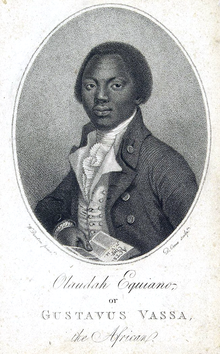The Interesting Narrative of the Life of Olaudah Equiano

Cover image
|
|
| Author | Olaudah Equiano |
|---|---|
| Country | Great Britain |
| Language | English |
| Subject | Autobiography |
|
Publication date
|
1789 |
| OCLC | 23633870 |
| LC Class | HT869.E6 A3 1794 |
The Interesting Narrative of the Life of Olaudah Equiano, Or Gustavus Vassa, The African, first published in 1789, is the autobiography of Olaudah Equiano. The narrative is argued to be a variety of styles, such as a slavery narrative, travel narrative, and spiritual narrative. The book describes Equiano's time spent in enslavement, and documents his attempts at becoming an independent man through his study of the Bible, and his eventual success in gaining his own freedom and in business thereafter.
Preface
Prior to chapter 1, Equiano writes, "An invidious falsehood having appeared in the Oracle of the 25th, and the Star of the 27th of April 1792, with a view to hurt my character, and to discredit and prevent the sale of my Narrative." Like many literary works written by black people during this time, Equiano's work was discredited as a false presentation of his slavery experience. To combat these accusations, Equiano includes a set of letters written by white people who "knew me when I first arrived in England, and could speak no language but that of Africa." In his article, Preface to Blackness: Text and PretextHenry Louis Gates Jr. discusses the use of prefaces by black authors to humanize their being which in turn made their work credible. In this section of the book, Equiano includes this preface to avoid further discrediting. Other notable works with a "preface to blackness" include the poems of Phyllis Wheatley.
Chapter 1
Equiano's narrative is written in first person as a whole. Prior to beginning his narrative in the first chapter, Equiano includes several letters that identify him as a person. The opening letters explain him as a person and are used to exemplify his character. Before his readers indulge into his narrative, he makes it a priority to ensure that they are aware of his good character. This is a huge key for Equiano as it sets the stage for what is to come in chapter 1.
Equiano opens his Narrative by explaining the struggle that comes with writing a memoir. He is very passionate about the hardships that memoir writers go through. He explains that they often have to defend themselves from those who remain critical about the truth of their work. He apologizes to his readers in advance for not having the most exciting story, but hopes that it serves to be helpful to other slaves in his position. He states, “I am neither a saint, a hero, nor a tyrant.” He begins his story with a description of his homeland and the district in which he was born. He was born in the kingdom of Benin. Benin was a part of Guinea. The specific district that he represented was Eboe. Eboe is in the same area as what is now, Nigeria. Within the district, Equiano was born in Essake, a small province, in 1745. He goes into detail concerning his district and the isolation of his province.
...
Wikipedia
